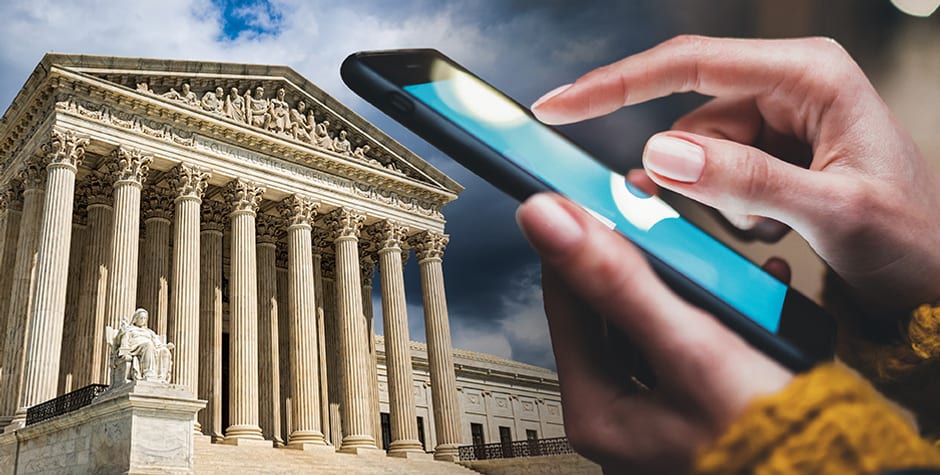Questions Remain After Supreme Court Rules on Your Social Media Free Speech Cases
Listen tothis article
Several opinions by the Supreme Court have just charted a course that will affect your freedom of expression on mammoth social media platforms. The ACLJ was active as amicus in all of them.
Murthy: Biden’s Use of Big Tech To Silence Americans
One of those cases is Murthy v. Missouri (formerly Missouri v. Biden). From at least 2021 onward, the Biden White House, the Department of Homeland Security, the FBI, and other agencies have been covertly exerting pressure on giant social media platforms like Twitter (now X), Facebook, Instagram, Google, and its YouTube platform to censor Americans online. That prompted the states of Missouri and Louisiana, together with several citizens whose posts were suppressed, to sue the Biden Administration for violating their First Amendment rights.
The Supreme Court has now ruled on the case. Regrettably, it has raised more questions than answers in a historic legal battle that Missouri Attorney General Andrew Bailey had vowed to continue fighting, this time back at the trial level. You can count on the ACLJ to continue fighting as well.
Previously, the U.S. Court of Appeals for the Fifth Circuit, where the ACLJ had filed an amicus brief challenging the Biden censorship campaign, had ruled that the Biden Administration’s suppressive behavior against American citizens warranted an extensive injunction directed at the White House and various Executive Branch offices and agencies. The vast scope of the Biden internet censorship scheme was breathtaking, shutting down physicians and health policy groups that questioned the Biden Covid lockdowns and mask mandates and blocking politicians, advocacy groups, and conservatives who criticized the Biden agenda during elections.
The Administration appealed, and the U.S. Supreme Court has now decided the case. In doing so, the Court sidestepped the merits, instead resolving the matter at this stage on a technical point of standing – and leaving behind a legally complex landscape in its wake.
While the plaintiffs had clearly been censored by the big social media platforms, the Court held in a 6-3 decision that they had failed to sufficiently trace their online suppression back to the timeline when the Biden White House and the federal agencies were pressuring Silicon Valley companies to shut down the online speech of U.S. citizens. That, the majority wrote, fails to satisfy the requirement of standing to sue under these facts. Justice Alito dissented, joined by Justices Thomas and Gorsuch, writing that the “White House threats [that coerced Big Tech companies to censor Americans] did not come with expiration dates.” In our amicus brief to the Court, we were particularly troubled over the blatantly intentional nature of this censorship plot. As we argued:
A federal censorship scheme that deliberately sequesters certain citizen ideas from public consumption directly undermines the goal of an informed electorate.
While we respect the majority’s acceptance of the Administration’s statement “that it will not resume [the election-related censorship] operations for the 2024 election,” we believe trust requires verification. We look forward to a continuance of the litigation back at the U.S. District Court, including aggressive discovery into the Biden censorship scheme, past, present, and future, sufficient to satisfy the standing of plaintiffs, and that will prove the full dimension of the unconstitutional conduct of the Biden Administration.
The NetChoice Cases
In NetChoice LLC v. Paxton, and Moody v. Netchoice LLC, the major Big Tech companies, through their advocacy group NetChoice, brought legal challenges against the state laws of Texas and Florida, respectively, both of which require the largest social media platforms to make decisions about censoring content from users on their platforms without discriminating based on viewpoint. Those laws were passed because of the increasing public awareness that huge social media platforms were discriminating against conservative political and religious content.
In the end, though, no judgment on the merits was rendered by the Supreme Court. Instead, the Court remanded the case back to the two lower courts at the Eleventh and Fifth Circuits for a further factual record and a corrected legal standard. Part of the problem was NetChoice’s decision to sue with a facial challenge to the laws rather than an as-applied approach, which was coupled with the lower courts’ failure to apply the correct legal analysis.
Regardless, two things appear to stand out in the opinion. First, much of the way that Big Tech platforms handle user content is protected by the First Amendment, although that does not entirely decide the issue, because the extent to which they may be burdened by the laws has still to be developed in the factual record. Second, the Court noted that regulatory laws, like those from Florida and Texas, or acts of Congress for that matter, have a legitimate interest in protecting online market “competition” so citizens can enjoy a “well-functioning sphere of expression.”
All of this indicates the need for a balancing of differing interests, something that ACLJ has previously argued in these cases. At the Supreme Court, we urged the Court in our amicus brief to exercise a careful balance in approaching the two competing interests at play in the cases:
At issue in this pair of cases is, on one hand, the power of the social media titans to exclude, shadow ban, or downgrade disfavored actors and ideas (potentially including amicus and its clients) and, on the other hand, the danger of government meddling with private speech platforms (illustrated by the Biden Administration’s manipulation of social media).
Finally, you can always count on at least one thing in this complicated legal landscape: The ACLJ will continue to fight for your right to have your voice fairly heard in every public venue, including the internet and on those social media platforms of the large technology companies that dominate it.
